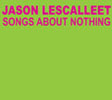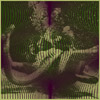 Lescalleet has been expertly mangling old and decrepit electronics for years, but the past few months have been especially productive with these two high profile releases and a recent tour. His work has consistently inhabited that gray world between noise and avant garde electronics, placed somewhere between harsh brutality and beard-stroking experimentalism. These new works, both solo and with Aaron Dilloway, continue this, making serious art with some occasionally not so serious undercurrents.
Lescalleet has been expertly mangling old and decrepit electronics for years, but the past few months have been especially productive with these two high profile releases and a recent tour. His work has consistently inhabited that gray world between noise and avant garde electronics, placed somewhere between harsh brutality and beard-stroking experimentalism. These new works, both solo and with Aaron Dilloway, continue this, making serious art with some occasionally not so serious undercurrents.
The double disc Songs About Nothing is clearly inspired by Big Black's notorious Songs About Fucking, from the title to the artwork, to even some of the track titles and samples used.Titles are not so subtle references to that classic album ("The Beauty of Independent Music", "Escargot", etc,), and he even works it in to some of the source material.The former begins with a microscopic opening sample of "The Power of Independent Trucking" before engaging in a pile of shrill feedback and ugly noise.The complicated drones and layers could actually be rather beautiful, if not so painfully skewed towards the higher end frequencies.
Even more overtly, "The Power of Pussy" takes the opening amp hum and feedback from "Kitty Empire" and stretches it out to infinity, eventually melding with another pastiche of unrecognizable music before opening the gates of Hell."The Loop" is just that:an erratic loop mixed with field recordings and mangled tape noise that is simultaneously subtle, creepy, and then humorous, with what sounds like a kid yelling "good evening, motherfucker!" from somewhere near by at the piece's end.
"Beauty is a Bowtie (HTDW)" mostly stays away from the world of noise entirely, instead constructing a deep, muddy ambience with heavily treated fragments of voice occasionally poking through."Escargot" seems to bring in a bit of that Albini guitar scrape, but it eventually becomes an expansive, though low-end rumbling drone.Disc one closer "In Through The Out Door and Another Whore" mixes the worlds of digital and analog noise in a stuttering and fragmented mess before ending on a note of pure decay.
While the first disc was made up of a bunch of short pieces, the second one, Road Test, has just one:the 43 minute "The Future Belongs to No One."This closely mimics Lescalleet's recent live work, via tapes of cars, crowds, and industrial moans mixed together with electronic treatments.Compared to the ADHD laden first disc, there is a slow, deliberate sense of composition here.Staying on the more restrained end of chaos, stuttering elements of chopped and screwed musical samples pop up here and there, culminating in a slowly tempo-increasing drone that eventually reveals itself to be the chorus of Depeche Mode's "It's No Good" before collapsing to end the disc.
samples:

The Lescalleet/Dilloway collaborative LP has less of that sense of fun about it, but it is by no means a dour, pretentious work.While both artists are known for (and employ here) working with cassettes, it is instead their combined use of analog synths that define the two side-long pieces here.
"Shattered Capsules" is all slow, phasing analog waves mingling with one another.Stretched and effected tape sounds pop up here and there, but it is the dying pulses of the synths that command focus for the first half.The second is mostly textural analog creaks and groans, resembling nothing in particular other than captivating sound, closing on a shrill and somewhat unpleasant chirpy analog burst.
The other side of the record, "Burning Nest," goes more for the noise rather than the experiments.Opening with puffs of white noise, it pretty soon goes full bore into a wall of noise.It is not overly harsh or painful though, and instead has that cold, detached feeling of MB's earliest work, without the lo-fi murkiness or overextended reverb.That wall of noise disintegrates throughout the track, eventually replaced by creepy, Psycho-score like tape loops and overdriven loops.
There is a distinctly more serious feel to Grapes and Snakes, and a darker one in comparison to Songs About Nothing, and its not necessarily better or worse, just different.If anything, it exemplifies Lescalleet's flexibility as an artist and composer, going from almost jovial chaos and nuanced structure on the former, and serious, slow burning electronics and harsh noise on the latter.Aaron Dilloway's contribution is not to be ignored either:he has been continually refining and retooling his approach from harsh noise maven into a more refined composer, without losing his sense of experimentation.
Either alone or in this case with Dilloway, Lescalleet has not been a slouch before, but is thriving this year from his live shows and these two high profile releases.While his work might not be for everyone, made abundantly clear with his penchant for tinnitus inducing swells of noise, his work can not be simply pigeon-holed as noise or experimental, unlike a lot of one-dimensional artists working with similar approaches to sound art.
samples:
 
Read More

